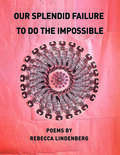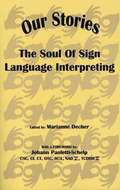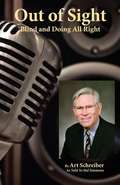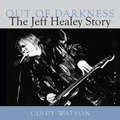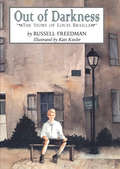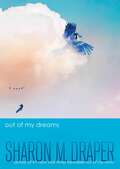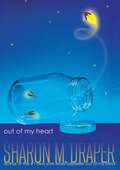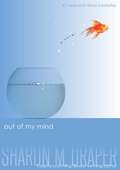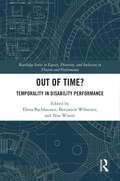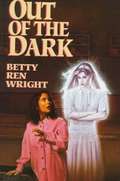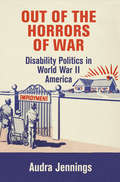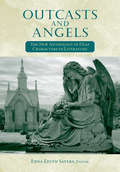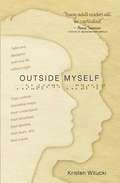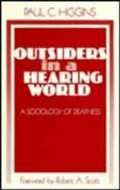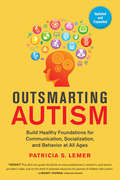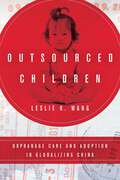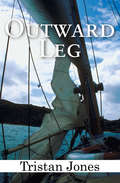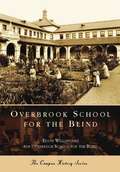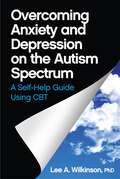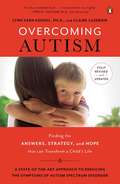- Table View
- List View
Our Splendid Failure to Do the Impossible
by Rebecca LindenbergLiving in landscapes of ruin and ruination, memory and problematic nostalgia, Rebecca Lindenberg’s Our Splendid Failure to Do the Impossible plumbs the depths of disruption, decay, and how we go on when the world stops cold. Inspired by the speaker’s experiences of living with type 1 diabetes, the collection chronicles humanity’s daily fight for survival in a world that’s bent on destroying itself.Lindenberg centers love, self-acceptance, and intimacy as incomparable balms across great geographical and psychological distances, and asks the reader to do the impossible: hope.
Our Stories: The Soul Of Sign Language Interpreting
by Marianne DecherShort vignettes of real life sign language interpreting experiences that left a mark on interpreters' souls. Some pieces are funny, some serious. A few are written by Deaf and Deaf-Blind consumers.
Out Of Sight: Blind And Doing All Right
by Art Schreiber Hal SimmonsA high level radio news broadcast executive, Art Schreiber suddenly lost his eyesight. At the top of his career as a radio station general manager, Art awoke one morning at a resort near Santa Fe, New Mexico, unable to see. His world was in complete darkness. After facing total despair, Art plotted his return to the top while learning to live life in a new way in a new world. Art's refusal to fold his tent when his eyesight failed and his struggle to live life to the fullest will inspire any person who reads his story. Art's greatest reward in life is encouraging and motivating others who face similar challenges.
Out into the Big Wide Lake
by Paul HarbridgeAn empowering and necessary picture book about a young girl with Down syndrome who gains confidence and independence through a visit to her grandparents.It's Kate's first time visiting her grandparents on her own at their lakeside home. She's nervous but excited at the adventure ahead. She helps her grandfather with his grocery deliveries by boat, where she meets all the neighbors, including a very grumpy old man named Walter. And she makes best friends with her grandparents' dog, Parbuckle.Her grandmother even teaches her to pilot the boat all by herself! When her grandfather takes ill suddenly, it's up to Kate -- but can she really make all those deliveries, even to grumpy old Walter? She has to try!Based on the author's sister, Kate is a lovable, brave, smart and feisty character who will capture your heart in this gorgeous and moving story about facing fears and gaining independence.
Out of Control (Duncan Mclain Mystery #6)
by Baynard KendrickBlind or not, Captain Duncan Maclain saw through Marcia Filmore almost from the start. She was young, beautiful, and deadly--a criminal psychopath who would stop at nothing to protect her rich marriage. And so, when blackmailer Walter Crane turned up dead, it was only natural that Maclain should start feeling his way through the dark and devious maze that led to Marcia. But that lethal lady intended to protect herself--even if she had to kill again . . . and again . . . and again...
Out of Darkness: The Jeff Healey Story
by Cindy Watson<P>Short-listed for the 2011 Golden Oak Award <P>From the moment three-year-old Jeff Healey first laid a guitar across his lap in what was to become his signature style, it was clear he was no ordinary kid. <P>Losing both eyes to retinoblastoma, a rare form of cancer, opened a door to another world for Jeff, a newly adopted infant. <P>Out of darkness he created music, becoming one of the most influential blues-rock and jazz performers of our time, beginning with his first hit album, See the Light. <P> In this up-close and personal account, loaded with never-before-seen photographs, memorabilia, and intimate recollections of family, friends, and fellow musicians, we discover this unique music icon’s dynamic career, which saw him collaborate with everyone from George Harrison and Eric Clapton to B.B. King and Stevie Ray Vaughan. <P>From Jeff’s lonely start one snowy night at St. Joseph’s Hospital in Toronto to his untimely end in the same building, we come away with a potent message of empowerment and a renewed sense of hope.
Out of Darkness: The Story of Louis Braille
by Russell FreedmanA biography of the 19th century Frenchman who developed Braille. The book spans Braille's life from childhood through his days at the Royal Institute for Blind Youth and into his final years, when the alphabet he invented was finally gaining acceptance.
Out of My Dreams (The Out of My Mind Series)
by Sharon M. DraperMelody flies to London to speak at a convention about differently abled kids in this &“warm and beautifully told&” (Kirkus Reviews, starred review) sequel to the acclaimed, New York Times bestselling middle grade novels Out of My Mind and Out of My Heart.When Melody saves an elderly back-in-the-day actress&’s life, she ends up on their local TV channel. The studio is so impressed with Melody that they arrange for her to be a speaker at an international symposium for kids who are differently abled, and this year&’s symposium is in London! To Melody&’s utter shock and delight, her parents say yes. Yes! Melody finally gets to fly on an airplane, and many adventures in London await, including a cheeky interaction with a royal guard&’s horse, becoming a little too acquainted with old-timey armor, and a run in with one of the most popular pop stars on the planet! But the biggest adventure is the I.D.E.A. symposium. There, Melody meets kids from all over the world who are rallying for greater accessibility and more thoughtful planning on how to make the world more equal for every kid, no matter the challenges they face. But as Melody&’s time to speak approaches, big-time nerves set in: how can a girl who&’s never spoken a word out loud in her life give an entire speech?
Out of My Heart (The Out of My Mind Series)
by Sharon M. DraperA New York Times bestseller! Melody faces her fears to follow her passion in this stunning sequel to the acclaimed, New York Times bestselling middle grade novel Out of My Mind.Melody, the huge-hearted heroine of Out of My Mind, is a year older, and a year braver. And now with her Medi-talker, she feels nothing&’s out of her reach, not even summer camp. There have to be camps for differently-abled kids like her, and she&’s going to sleuth one out. A place where she can trek through a forest, fly on a zip line, and even ride on a horse! A place where maybe she really can finally make a real friend, make her own decisions, and even do things on her own—the dream! By the light of flickering campfires and the power of thunderstorms, through the terror of unexpected creatures in cabins and the first sparkle of a crush, Melody&’s about to discover how brave and strong she really is.
Out of My Mind (The Out of My Mind Series)
by Sharon M. DraperThis special movie tie-in edition showcases a new cover with an image from the original movie now available on Disney+! A New York Times bestseller for three years and counting! &“Unflinching and realistic.&” —Kirkus Reviews (starred review) From award-winning author Sharon Draper comes a &“gutsy, candid, and compelling&” (School Library Journal, starred review) story that will forever change how we all look at anyone with a disability, perfect for fans of RJ Palacio&’s Wonder.Eleven-year-old Melody is not like most people. She can&’t walk. She can&’t talk. She can&’t write. All because she has cerebral palsy. But she also has a photographic memory; she can remember every detail of everything she has ever experienced. She&’s the smartest kid in her whole school, but NO ONE knows it. Most people—her teachers, her doctors, her classmates—dismiss her as mentally challenged because she can&’t tell them otherwise. But Melody refuses to be defined by her disability. And she&’s determined to let everyone know it…somehow.
Out of Time?: Temporality In Disability Performance (Routledge Series in Equity, Diversity, and Inclusion in Theatre and Performance)
by Elena BackhausenOut of Time? has many different meanings, amongst them outmoded, out of step, under time pressure, no time left, or simply delayed. In the disability context, it may also refer to resistant attitudes of living in “crip time” that contradict time as a linear process with a more or less predictable future. According to Alison Kafer, “crip time bends the clock to meet disabled bodies and minds.” What does this mean in the disability arts? What new concepts of accessibility, crip futures, and crip resistance can be staged or created by disability performance? And how does the notion of “out of time” connect crip time with pandemic time in disability performance? The collective volume seeks to respond to these questions by exploring crip time in disability performance as both a concept and a phenomenon. The book tackles the topic from two angles: on the one hand from a theoretical point of view that connects performance analysis with crip and performance theory, on the other hand from a practice-based perspective of disability artists who develop new concepts and dramaturgies of crip time based on their own lived experiences and observations in the field of the performing and disability arts. The book gathers different types of text genres, forms, and styles that mirror the diversity of their authors. Besides theoretical and academic chapters on disability performance, the book also includes essays, poems, dramatic texts, and choreographic concepts that ref lect upon the alternative knowledge in the disability arts.
Out of the Corner of My Eye: Living with Vision Loss in Later Life
by Nicolette Pernot RinggoldThe story of how one 87-year-old woman dealt with losing a great deal of vision and how she confronted its attendant frustrations.
Out of the Dark
by Betty Ren WrightWhen Jessica moves to her grandmother's childhood home and makes friends with the handicapped girl next door, she begins to have nightmares about the old schoolhouse in the woods.
Out of the Horrors of War: Disability Politics in World War II America (Politics and Culture in Modern America)
by Audra JenningsFrom workplace accidents to polio epidemics and new waves of immigration to the returning veterans of World War II, the first half of the twentieth century brought the issue of disability—what it was, what it meant, and how to address it—into national focus. Out of the Horrors of War: Disability Politics in World War II America explores the history of disability activism, concentrating on the American Federation of the Physically Handicapped (AFPH), a national, cross-disability organization founded during World War II to address federal disability policy. Unlike earlier disability groups, which had been organized around specific disabilities or shared military experience, AFPH brought thousands of disabled citizens and veterans into the national political arena, demanding equal access to economic security and full citizenship. At its core, the AFPH legislative campaign pushed the federal government to move disabled citizens from the margins to the center of the welfare state.Through extensive archival research, Audra Jennings examines the history of AFPH and its enduring legacy in the disability rights movement. Counter to most narratives that place the inception of disability activism in the 1970s, Jennings argues that the disability rights movement is firmly rooted in the politics of World War II. In the years immediately following the war, leaders in AFPH worked with organized labor movements to advocate for an ambitious political agenda, including employer education campaigns, a federal pension program, improved access to healthcare and education, and an affirmative action program for disabled workers. Out of the Horrors of War extends the arc of the disability rights movement into the 1940s and traces how its terms of inclusion influenced the movement for decades after, leading up to the Americans with Disabilities Act of 1990.
Outcasts and Angels: The New Anthology of Deaf Characters in Literature
by Edna Edith SayersIn 1976, Trent Batson and Eugene Bergman released their classic Angels and Outcasts: An Anthology of Deaf Characters in Literature. In it, they featured works from the 19th and 20th centuries by well-known authors such as Charles Dickens and Eudora Welty. They also presented less-well-known deaf authors, and they prefaced each excerpt with remarks on context, societal perceptions, and the dignity due to deaf people. Since then, much has transpired, turning around the literary criticism regarding portrayals of deaf people in print. Edna Edith Sayers reflects these changes in her new collection Outcasts and Angels: The New Anthology of Deaf Characters in Literature. Sayers mines the same literary vein as the first volume with rich new results. Her anthology also introduces rare works by early masters such as Daniel Defoe. She includes three new deaf authors, Charlotte Elizabeth, Howard T. Hofsteater, and Douglas Bullard, who offer compelling evidence of the attitudes toward deaf people current in their eras. In search of commonalities and comparisons, Sayers reveals that the defining elements of deaf literary characters are fluid and subtly different beyond the predominant dueling stereotypes of preternaturally spiritual beings and thuggish troglodytes. Outcasts and Angels demonstrates these subtle variations in writings by Ambrose Bierce, Isak Dinesen, Nadine Gordimer, and Flannery O'Connor. Stories by Juozas Grušas, Julian Barnes, and many other international authors broaden the scope of this updated inquiry into the deaf literary character. Sayer's preface and closing essay bring any disparate parts together, completing Outcasts and Angels as a fitting, contemporary companion to the original classic collection.
Outside Myself
by Kristen WituckiExtraordinary insight into living without sight Outside Myself will enlighten both young and old.
Outsiders in a Hearing World: A Sociology of Deafness
by Paul C. HigginsSociological observations on several topics in the deaf community: identity, deviance among the deaf, stigma, and encounters with the hearing.
Outsmarting Autism, Updated and Expanded: Build Healthy Foundations for Communication, Socialization, and Behavior at All Ages
by Patricia S. LemerA comprehensive resource for parents, therapists, caregivers, and educators, packed with lifelong strategies for Autism Spectrum Disorder (ASD) management and supportNewly revised and updated, this user-friendly guide addresses autism identification, treatment, and prevention from pre-conception through adulthood. Outsmarting Autism describes more than 50 practical approaches with proven efficacy, including lifestyle modification, dietary considerations, and boosting the immune system. After health improves, focus turns to developing the sensory foundations for communication, social skills, and learning.Patricia Lemer's approach is grounded in research on multifactorial causes, or "Total Load Theory," which explains that developmental delays are caused not by one single factor, but by an overload of environmental stressors on genetically vulnerable individuals. Because every person with autism is unique, this book guides readers to the therapies that may be right for each individual, helping to make the difference between management and healing. New research on topics like stem cells, cannabis, and dentistry is now included.
Outsourced Children: Orphanage Care and Adoption in Globalizing China
by Leslie K. WangIt's no secret that tens of thousands of Chinese children have been adopted by American parents and that Western aid organizations have invested in helping orphans in China--but why have Chinese authorities allowed this exchange, and what does it reveal about processes of globalization? Countries that allow their vulnerable children to be cared for by outsiders are typically viewed as weaker global players. However, Leslie K. Wang argues that China has turned this notion on its head by outsourcing the care of its unwanted children to attract foreign resources and secure closer ties with Western nations. She demonstrates the two main ways that this "outsourced intimacy" operates as an ongoing transnational exchange: first, through the exportation of mostly healthy girls into Western homes via adoption, and second, through the subsequent importation of first-world actors, resources, and practices into orphanages to care for the mostly special needs youth left behind. Outsourced Children reveals the different care standards offered in Chinese state-run orphanages that were aided by Western humanitarian organizations. Wang explains how such transnational partnerships place marginalized children squarely at the intersection of public and private spheres, state and civil society, and local and global agendas. While Western societies view childhood as an innocent time, unaffected by politics, this book explores how children both symbolize and influence national futures.
Outward Leg
by Tristan JonesAfter seven years ashore and after having his left leg amputated, Tristan Jones decided to return to the sea. He began to piece together Operation Star and found the perfect vessel in a 36-foot trimaran. In October 1983, Jones and his only crew member, Wally Rediske, set out in Outward Leg from San Diego, intending to circumnavigate the world from west to east by sail.The book is the exciting story of Tristan's preparation for this major seagoing event and the chronicle of half of it. Tristan sailed down the western coast of Central America through the Panama Canal to a small Colombian town. There he had to fight for survival among hostile natives, drug dealers, and uncooperative port officers. He went on to Venezuela, Aruba, and the Dominican Republic during its 1984 revolution. Finally he reached New York and crossed the Atlantic to return to St. Katharine's Dock in London where he began his seagoing life thirty years before.
Over My Head
by Claudia L. OsbornFrom the Book: A Doctor's own story of head injury from the inside looking out.
Overbrook School for the Blind (The Campus History Series)
by Edith WilloughbySince 1832, Overbrook School for the Blind has been a leader in providing educational programs to children and young people who are blind and visually impaired. Julius Friedlander, the schools founder, and other early leaders worked hard to inform people about the educational needs of the children. Their efforts resulted in providing reading material for the blind and Overbrook's production of the first embossed book in America, the Gospel of Mark, and the publication of the first magazine for the blind, Lux en Tenebrae. Offering students access to all educational opportunities continues to be the schools main goal, and in the early 1990s, Overbrook pioneered the development of a school wide technology initiative that provided students with the ability to access the curriculum, communicate, and be successful in employment. Through rare photographs and documents, Overbrook School for the Blind offers a glimpse at the schools role in reaching out to people who are blind and it showcases how Overbrook has helped thousands of students to achieve independence, self-confidence, and the skills to experience active and fulfilling lives.
Overcoming Anxiety and Depression on the Autism Spectrum: A Self-Help Guide Using CBT
by Lee WilkinsonCognitive Behavioral Therapy (CBT) has been shown to be effective for treating mental health problems such as anxiety and depression in individuals both with and without autism spectrum disorders. This book bridges the gap between research and practice and shows adults on the spectrum practical ways to manage their emotions. Many adults on the autism spectrum experience isolation, interpersonal difficulties, anxiety, depressed mood, and coping problems. By applying theory and concepts from autism research, this book will help adults on the spectrum to understand their challenges. The author takes the best of CBT self-help strategies, to encourage self-analysis, and to help adults on the spectrum make better decisions in activities such as employment or relationships. This is an essential self-help guide for adults on the spectrum looking for ways to cope with emotional challenges, and will also be a useful resource for clinicians, psychologists, therapists, and counselors working with them.
Overcoming Autism
by Lynn Kern KoegelWith a 300 percent increase in the incidence of autism and autism spectrum disorders and 1 in 150 children being diagnosed with the disability, autism is now an epidemic. Fortunately, there have been huge advances in our ability to diagnose the disability at younger ages and in the development of effective interventions that can change children's lives. In Overcoming Autism, Lynn Kern Koegel, Ph. D. , one of the most well-known and highly respected experts on treating autism, shares her professional advice while coauthor Claire LaZebnik, a professional writer whose son has autism, provides insight into the daily life of parents coping with autism. It's a difficult disability to live with, but it doesn't have to devastate a family. In this book, Koegel and LaZebnik offer concrete ways to immediately begin improving the symptoms of autism and the emotional life of anyone coping with the disorder. Providing a complete program of strategies that can be tailored to any child's specific needs, this is a must-read, must-own book that offers hope through practical solutions which are warm, nurturing, and designed to fit into a family's daily life. The writers never lose sight of the humor that lurks in the quirkiness of the disability or the importance of enjoying and loving your child.
